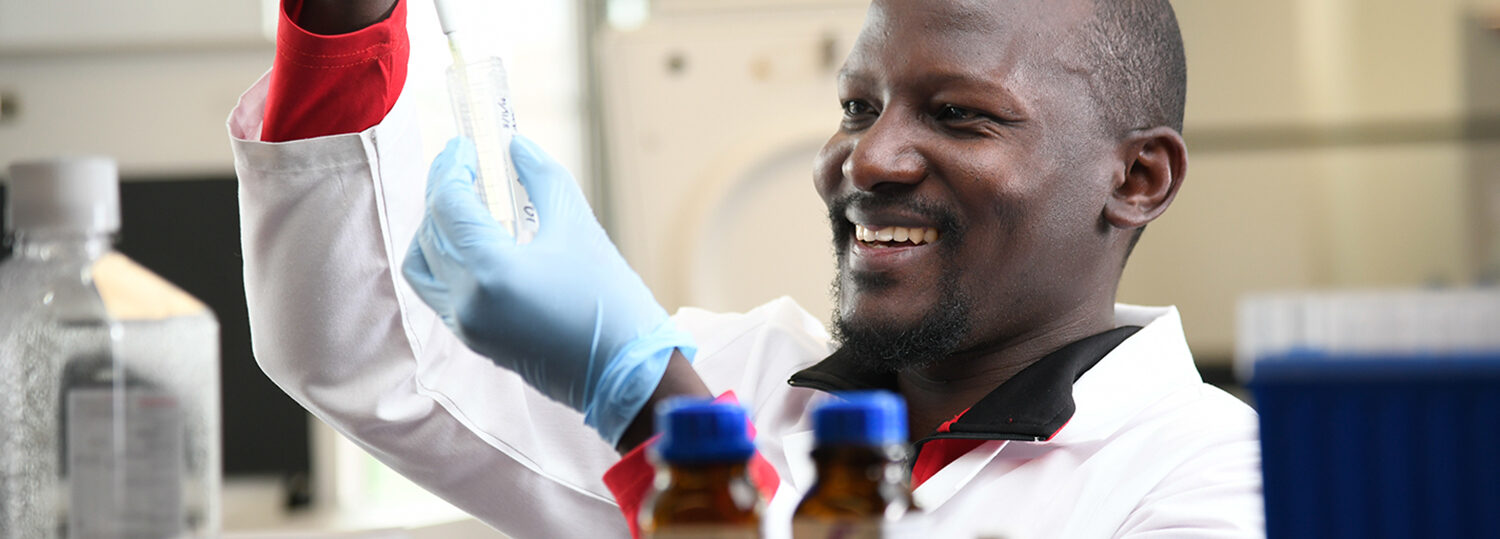When Bonny Oloka visited his grandparents in their rural Ugandan village, he was often served sweet potatoes – and only sweet potatoes – for three days straight.
Today, Oloka works with one of the world’s foremost experts, Craig Yencho of the Department of Horticultural Science, as a Ph.D. student, helping develop high-tech tools to improve potato breeding and fight malnutrition.
“My name is Bonny Oloka, and my work at CALS is part of a broader effort to improve our staple foods in sub-Saharan Africa by making them more resilient and nutritious. I want to alleviate hunger, poverty and malnutrition.
“Back in Uganda, like most of the region, all sweet potato planting and harvesting is done by hand, mostly by women farmers. Here, it has been a great experience walking behind the tractor and watching it plant slips in the soil in just the right depth and spacing. This, among various other experiences, is something I want to see back in Uganda in my lifetime.
“The beauty about CALS is that students don’t learn only about the crop they are working on. … My adviser is Craig Yencho of the Department of Horticultural Science, and I have an animal scientist on my doctoral committee who taught me most of the practical quantitative genetics and computer skills I needed to execute my own genomics research. Two postdoctoral research scholars in the Bioinformatics Research Center helped analyze my data.
“In Uganda, I will continue with the work that we started here on sweet potato, alongside Benard Yada and [2016 World Food Prize winner] Robert Mwanga – both former students in CALS. In the GT4SP project, funded by the Bill and Melinda Gates Foundation, we have developed genomic, genetic and bioinformatics tools. Harnessing those tools has immense potential – we can advance understanding of the complex genetics of this crop, then deploy these tools to breed better varieties in the shortest possible time.
“I will continue working on this even after I graduate. This is just the beginning.”
My Research: Fighting Hidden Hunger
 The average Ugandan eats 220 pounds of sweet potatoes in a year, and Uganda is the world’s third-leading producer – but Uganda’s farm fields yield only about four tons of sweet potatoes an acre, compared to as much as 22 tons per acre in the United States. Uganda’s white- or cream-fleshed varieties are also lower in beta carotene, leading to “hidden hunger”: People who eat only the sweet potatoes may feel full yet be malnourished.
The average Ugandan eats 220 pounds of sweet potatoes in a year, and Uganda is the world’s third-leading producer – but Uganda’s farm fields yield only about four tons of sweet potatoes an acre, compared to as much as 22 tons per acre in the United States. Uganda’s white- or cream-fleshed varieties are also lower in beta carotene, leading to “hidden hunger”: People who eat only the sweet potatoes may feel full yet be malnourished.
My research with CALS sweet potato experts has involved identifying quantitative trait loci – sections of DNA that correlate with specific traits – for resistance to sweet potato weevils and sweet potato virus disease as well as for better beta-carotene, starch and dry matter content. With those QTLs, scientists can improve the crop faster using marker-assisted selection.
Written by Chelsea Kellner

